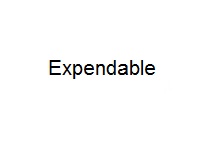
Expendable

A self-driving car is working its way down a busy high street and encounters a situation where an accident is unavoidable. Does it ram into the oncoming vehicle in the wrong lane or take evasive action which results in it hitting pedestrians?
Computers respond much quicker than people, they don't get tired and thus advantageous in this task - driving cars for us. It poses some ethical questions. How do we determine the behaviour of self-driving cars? Namely, what to do when a crash is imminent. Who lives, who dies. How do we decide what to program into the computers controlling the car?
Many a scenario is up for debate. Does the car do what it must to protect the occupants or steer clear from hurting others around it. From the outset, I would claim that the car should do its utmost to avoid harming a bystander, a pedestrian. This would be at the expense of those in the vehicle.
The consensus of a government committee is highly likely to establish a minimum damage ideal. Kill the least, save the most. Take a self-driving bus with as many as sixty fare paying passengers aboard. The only option to avoid careering off a bridge is to mow a parent walking their toddler along the side path. A government body will lean towards the argument that protecting sixty outweighs two that have chosen to get some exercise walking. I still hold the view that the two 'innocents' take priority. Stamp in big letters on the bus ticket: "In event of this bus crashing, the priority of your life is lower down the list than those not being carried. " When it comes to human drivers, rightly or wrongly, it has become the norm to describe crashes as incidents rather than accidents as it seems there is always someone at fault, someone to cast the blame onto. Whether it was an accident or incident we think we are in control and can multi-task. Unfortunately, we can only pay attention to one thing at a time and find ourselves out of control quite often. Often when we are distracted.
When a motorcyclist hits a tree, we hope that the tree is unharmed. If they were choosing to go too fast and too carelessly then they took their destiny in their own hands. We will feel sorry and pity for the motorcyclist for sure but will be super angry if it is not a tree they hit, but a small child playing in their back garden. This is the basis for the claim that the occupants of a self-driving vehicle have a hidden and unspoken duty to ensure that nobody outside of that vehicle is put in danger. Those that get the fun, pleasure and convenience of being transported in it, lose the importance of being kept alive at all costs.
People will consider many variations; a crash may not kill the occupants. With air bags and crumple zones to absorb some of the impact there is room for hope. Such hope is considerably smaller for people hit by a vehicle.
An aeroplane in distress has an obligation to land in an empty field, not smash into block of flats or tear up a school. If you can't be sure of landing clear of a building, take the option that avoids casualties on the ground, even if that means less chance of survival for those in the plane.
Were a pedestrian to step into the road it is a different story. They are engaging with the road and must ensure it is safe to cross. A self-driving car must avoid those on the pavement but find the lowest loss of life solution with those on the road whether in a vehicle or not.
Sacrifice
A set of soldiers may be sacrificed to save the occupants of a small village. However, a war planner may let the villagers meet their fate because the soldiers are needed for another campaign. The reasoning is that to win a war, difficult decisions must be made weighing up many things in the so-called bigger picture. By ending the fighting at the earliest opportunity, it will save a lot more in the long run. Governments can feel justified dispensing with some souls to protect the masses.
An army recruitment advert presented the audience with a choice: They have 1 blanket. Who gets it? The army medic, the soldier with the best fighting skills or the important diplomat. The answer given was to put the blanket around the engine. The cold weather will disable it and all will perish if they can't get it started in the morning. If one, two or three of them wake up alive in the morning so be it. Would you let someone you care for, maybe a parent a spouse or child be sacrificed for the benefit of the nation? What good is the nation to you without those you love around you.
Consider a super hypothetical event where your husband/wife was to be experimented on to extract some anti-bodies for a horrible disease. The partner will likely die, but it will produce medicine that saves many hundred. If it was an ex-husband/ex-wife the decision would be easy. Oh, how we can go from loving someone to hate so quickly at times. Nevertheless, how many cheeky, selfish, self-orientated folk would consider some kind of negotiation? Give me a guarantee that a couple of those saved would marry me, then yes, go ahead. There are plenty of farfetched scenarios and unlikely events. However, in the spur of the moment and in times of stress and pressure, we behave so much differently than when we have time to mull things over in the comfort of an armchair.
Do what you have to do, go about your day with the cares that you have. However, when your actions harm someone else, expect revenge from those that cherish that someone. We can come to terms with incidents that are difficult to foresee. What is harder to let be, are cases where people do not heed warning after warning and have the opportunity to amend their ways.
Take the use of mobile telephones in cars. There are many times where a death has been attributed to the driver using a phone whilst at the wheel. Few understand that taking calls using some handsfree device is just as bad as having a phone up to the ear. People are surprised to learn that the distraction of taking to someone outside of the vehicle is still dangerous. We think it is only dangerous to mess with the phone with our hands. When we talk to a passenger, they are aware of the current road conditions and can pause and react. The person on the other end of the phone diverts your mind away from what you are doing and can't tell that you are approaching a busy junction for instance. Your thoughts are taken away from inside the car to something else outside of it.
If you were unaware of the dangerous effects of phone use, then it is a bit easier to excuse it. We have much less time for those that are informed of the danger of any phone use and have a great reluctance to change their ways. Law makers have the option to review what you were doing prior to an incident. They may consider doubling/trebling the punishment for those found out to be distracted from driving by other actions.
Update 20/12/2017
Guy Martin fronted a program about self-driving cars. He stated that he would let the jeopardy rest with those in the car, "they are in the killing machine. " The narrator said that Guy's view is unconventional.
The bulk of the people doing online tests to decide who should live and who should die, leant towards seeking the least casualties overall. However, these tests are seriously flawed. It takes a lot of pondering and consideration to come to a rounded judgement. Sitting in front of a screen and pressing a few buttons to make some choices does not constitute a fully deliberated view. Lots of people with the same quick response does not amplify the merit of their conclusion.
Classing it as unconventional implies that the debate is over. This is wholly unreasonable. The idea of being able to do what ever you like so long as it is not endangering others is not an unconventional view.
Copyright © 2003-2022. Ignorance Paradox all rights reserved

